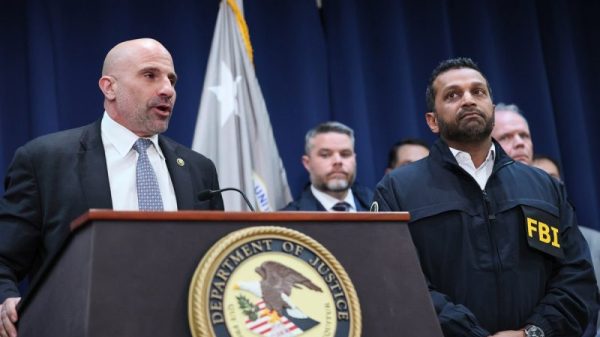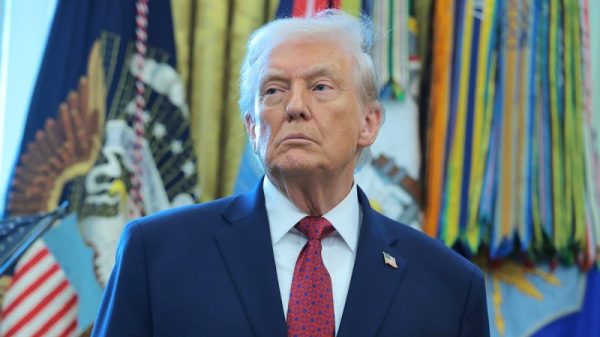It’s become evident that Donald Trump doesn’t want to debate on Aug. 23. While that’s not useful to the voters who hope to see how he matches up with his challengers in that forum, it’s probably the smart move politically. Why give your opponents a crack at you and risk a stumble when you’re up in the polls by nearly 40 points?
But what’s also evident is that by ceding the debate stage to his opponents, the former president could be allowing an unwelcome and growing narrative to gain traction in the GOP.
That narrative: that Trump lost the 2020 election.
Trump’s indictment in special counsel Jack Smith’s investigation into Jan. 6, 2021, has meant revisiting the 2020 election. What has been striking about the GOP’s defense of Trump is how little it involves arguing that he was actually right about the election being illegitimate; mostly it’s about how Trump was somehow so deluded that he actually believed his claims, thus supposedly insulating him legally.
But we’ve also seen something of an evolution from Trump’s 2024 opponents on that more fundamental question of the legitimacy of Trump’s defeat.
Thanks to Florida Gov. Ron DeSantis (R) finally deciding, after 33 months, to say Trump lost, nearly all of them have now done so.
Some of the candidates have layered their acknowledgments that Trump lost with vague allusions to supposed problems with the election. That was the way Republicans couched their comments when they tried to massage Trump’s wild claims between November 2020 and January 2021. But now they are at least near unanimous that he lost, which is contrary to Trump’s own continued insistence that he was the rightful winner.
Here’s what they’ve said:
DeSantis: “Of course he lost.”Sen. Tim Scott (R-S.C.): “I do not believe the election was stolen.”Former U.N. ambassador Nikki Haley: “Do I think Joe Biden is the legitimate president? Yes.” (Haley added: “He’s a bad one at that.”)Former New Jersey governor Chris Christie: “Of course he lost, and I believe he lost because he lost in a full and fair election.”Vivek Ramaswamy: “[I] was very clear about the fact that Trump lost the election. And I was disappointed that he did not accept that result.”Former Arkansas governor Asa Hutchinson: “I don’t believe the election was stolen, and I respect the results.”
The first five names above will grace the debate stage, with or without Trump. The list doesn’t include former vice president Mike Pence, who we learned Monday night has also qualified to join the debate.
Pence’s commentary on this matter is narrower but arguably more significant. In recent weeks, he has leaned in to the idea that Trump asked him to violate the Constitution by pressuring him to help overturn the election. Pence has been forcing the issue more than anyone else with the possible exception of Christie.
What that leaves is the prospect of a debate stage dominated by people who have labeled Trump a loser, in one form or another, and/or said his plot to overturn it was wrong. That would come even as Trump has signaled he’d like to use his indictment to re-litigate the fantasy that he actually won and that his efforts were legitimate.
That doesn’t mean all the candidates will press the issue. DeSantis, in particular, had to be coaxed into offering his relatively mild acknowledgment of reality Monday. (He had repeatedly and conspicuously declined to weigh in over the past two-plus years and even tried to talk around the question again in the NBC interview where he made the admission.) The fact that nearly 7 in 10 Republicans still consider Biden’s win illegitimate makes this a continually fraught topic.
No one should get too much credit for merely acknowledging a reality that has been clear for a long time and layering it with the kinds of innuendo that gave the party base the permission structure to embrace Trump’s claims in the first place.
But it is worth emphasizing how many of the most prominent Republicans have effectively disputed Trump’s claim that he really won. It’s not just Trump’s 2024 opponents, but also House Speaker Kevin McCarthy (R-Calif.), Senate GOP Leader Mitch McConnell (R-Ky.), Republican National Committee Chairwoman Ronna McDaniel, Sen. Lindsey O. Graham (R-S.C.) and others who have otherwise supported Trump.
Trump’s indictment makes it necessary for all of them to weigh in on issues they’ve generally carefully avoided or tried to triangulate since late 2020. But it also affords them the opportunity to look like they’re defending Trump legally without actually vouching for his central claim. It’s kind of like when a lot of Republicans voted to acquit Trump at his second impeachment trial not because he was faultless, but because of the technicality that he wasn’t a sitting president by that point.
What seems clear is that many of them would prefer to push the party away from the brand of election denialism that has so empowered Trump in the party but has cost the party itself, including in the 2022 midterms. Yet they lack the will or wherewithal, or both.
If the indictment has done nothing else, it has at least provided an opportunity to say something they have avoided for so long.
It’s become evident that Donald Trump doesn’t want to debate on Aug. 23. While that’s not useful to the voters who hope to see how he matches up with his challengers in that forum, it’s probably the smart move politically. Why give your opponents a crack at you and risk a stumble when you’re up in the polls by nearly 40 points?
But what’s also evident is that by ceding the debate stage to his opponents, the former president could be allowing an unwelcome and growing narrative to gain traction in the GOP.
That narrative: that Trump lost the 2020 election.
Trump’s indictment in special counsel Jack Smith’s investigation into Jan. 6, 2021, has meant revisiting the 2020 election. What has been striking about the GOP’s defense of Trump is how little it involves arguing that he was actually right about the election being illegitimate; mostly it’s about how Trump was somehow so deluded that he actually believed his claims, thus supposedly insulating him legally.
But we’ve also seen something of an evolution from Trump’s 2024 opponents on that more fundamental question of the legitimacy of Trump’s defeat.
Thanks to Florida Gov. Ron DeSantis (R) finally deciding, after 33 months, to say Trump lost, nearly all of them have now done so.
Some of the candidates have layered their acknowledgments that Trump lost with vague allusions to supposed problems with the election. That was the way Republicans couched their comments when they tried to massage Trump’s wild claims between November 2020 and January 2021. But now they are at least near unanimous that he lost, which is contrary to Trump’s own continued insistence that he was the rightful winner.
Here’s what they’ve said:
DeSantis: “Of course he lost.”Sen. Tim Scott (R-S.C.): “I do not believe the election was stolen.”Former U.N. ambassador Nikki Haley: “Do I think Joe Biden is the legitimate president? Yes.” (Haley added: “He’s a bad one at that.”)Former New Jersey governor Chris Christie: “Of course he lost, and I believe he lost because he lost in a full and fair election.”Vivek Ramaswamy: “[I] was very clear about the fact that Trump lost the election. And I was disappointed that he did not accept that result.”Former Arkansas governor Asa Hutchinson: “I don’t believe the election was stolen, and I respect the results.”
The first five names above will grace the debate stage, with or without Trump. The list doesn’t include former vice president Mike Pence, who we learned Monday night has also qualified to join the debate.
Pence’s commentary on this matter is narrower but arguably more significant. In recent weeks, he has leaned in to the idea that Trump asked him to violate the Constitution by pressuring him to help overturn the election. Pence has been forcing the issue more than anyone else with the possible exception of Christie.
What that leaves is the prospect of a debate stage dominated by people who have labeled Trump a loser, in one form or another, and/or said his plot to overturn it was wrong. That would come even as Trump has signaled he’d like to use his indictment to re-litigate the fantasy that he actually won and that his efforts were legitimate.
That doesn’t mean all the candidates will press the issue. DeSantis, in particular, had to be coaxed into offering his relatively mild acknowledgment of reality Monday. (He had repeatedly and conspicuously declined to weigh in over the past two-plus years and even tried to talk around the question again in the NBC interview where he made the admission.) The fact that nearly 7 in 10 Republicans still consider Biden’s win illegitimate makes this a continually fraught topic.
No one should get too much credit for merely acknowledging a reality that has been clear for a long time and layering it with the kinds of innuendo that gave the party base the permission structure to embrace Trump’s claims in the first place.
But it is worth emphasizing how many of the most prominent Republicans have effectively disputed Trump’s claim that he really won. It’s not just Trump’s 2024 opponents, but also House Speaker Kevin McCarthy (R-Calif.), Senate GOP Leader Mitch McConnell (R-Ky.), Republican National Committee Chairwoman Ronna McDaniel, Sen. Lindsey O. Graham (R-S.C.) and others who have otherwise supported Trump.
Trump’s indictment makes it necessary for all of them to weigh in on issues they’ve generally carefully avoided or tried to triangulate since late 2020. But it also affords them the opportunity to look like they’re defending Trump legally without actually vouching for his central claim. It’s kind of like when a lot of Republicans voted to acquit Trump at his second impeachment trial not because he was faultless, but because of the technicality that he wasn’t a sitting president by that point.
What seems clear is that many of them would prefer to push the party away from the brand of election denialism that has so empowered Trump in the party but has cost the party itself, including in the 2022 midterms. Yet they lack the will or wherewithal, or both.
If the indictment has done nothing else, it has at least provided an opportunity to say something they have avoided for so long.





















